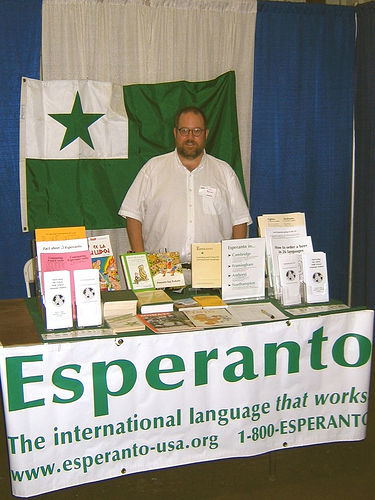
One friend used to call it, “The next dead language.” My response? “Ne estu idioto!” Esperanto is far from dead, though at times, I feel that it is staggering around the world zombie-like, gibbering strangely, arms outstretched, seeking new victims. And I myself am one of the undead. On the other hand, the damned thing has changed my life. Just over 10 years ago, I started studying it, partly out of a need to convince myself that I could learn another language. My forays into French, Spanish and even the German of my ancestors captured only an ability to count to 10 in each plus the certainty that I would never be at a loss to ask where the restroom was. Using Esperanto, I have traveled to many places where English is not the common language: China, the Czech Republic, France, Italy, Brazil, Lithuania, Belgium and the Netherlands. With Esperanto, I have acted in film, performed on stage, sung songs and written articles, stories, and poems—basically had a lot of fun that I might not have had otherwise.
Jamaica RPCV Steve Wagenseller writes: Vivu Esperanto!
Vivu Esperanto!
Esperanto: So easy, a caveman...
by Steve Wagenseller / 03-28-2007
Vivu Esperanto!
Caption: Steve Brewer kunordigis tablon ce la Better World Expo en Northampton, Massachusetts. Photo Credit: limako Flickr Creative Commons Attribution-ShareAlike 2.0
One friend used to call it, “The next dead language.” My response? “Ne estu idioto!” Esperanto is far from dead, though at times, I feel that it is staggering around the world zombie-like, gibbering strangely, arms outstretched, seeking new victims. And I myself am one of the undead.
On the other hand, the damned thing has changed my life. Just over 10 years ago, I started studying it, partly out of a need to convince myself that I could learn another language. My forays into French, Spanish and even the German of my ancestors captured only an ability to count to 10 in each plus the certainty that I would never be at a loss to ask where the restroom was.
Using Esperanto, I have traveled to many places where English is not the common language: China, the Czech Republic, France, Italy, Brazil, Lithuania, Belgium and the Netherlands. With Esperanto, I have acted in film, performed on stage, sung songs and written articles, stories, and poems—basically had a lot of fun that I might not have had otherwise.
It is, after all, a language so easy, even a caveman can do it. Seriously—cavemen are into Esperanto. Surf over to the Geico-sponsored website, [cavemenscrib.com], and go inside the virtual apartment of these urbane Neanderthals. After you’ve had your fun scanning their iPod’s party mix, comparing notes with their March Madness picks, head into the kitchen to check out the poetry magnets on the fridge. They’re in Esperanto. Not perfect Esperanto, but to paraphrase Samuel Johnson, it’s not that they’ve done it well, I’m surprised to find it done at all.
Now if such savvy sophisticates are using “The International Language,” do I still have any reason to be ashamed? Well, sure. I mean, I was in the Peace Corps, I teach middle school, I love theater and I was once married to a Miss Hawai‘i—I’m the Patron Saint of Lost Causes. Esperanto is for starry-eyed idealists who want to change the world. And, as so many people like to point out, it’s a failed experiment. Maybe. Times are changing and the experiment is still going on. A quick Google search of “Esperanto” brings up 35 million hits, though not all are references to the language. That’s because the word has become shorthand for, among other things, gobbledygook, jargon, as well as ease of communication. Go figure.
Mexican filmmaker Guillermo del Toro uses that latter sense when he calls the art of film, “the new Esperanto.” Producer/director Alberto Cuáron named his production company, “Esperanto filmoj” (Esperanto films). Evidently, even Fidel Castro speaks it fluently. But you don’t have to be Hispanic to lay claim to it—Esperantists can be found worldwide. Last summer, I stayed with Esperantists in France through a service called “Pasporta Servo.” It’s a directory of Esperantists who will host you in their homes for free, as long as you speak the language. Last year’s booklet listed 1,320 hosts in 92 countries worldwide. Not impressive enough? A recent check of Wikipedia’s Esperanto pages shows just under 70,000 articles in the language. In fact, at the moment, it’s the 15th largest language section—bigger than Indonesian, Turkish and even Danish.
How hard is it to learn? That depends. Mostly it depends upon your facility for languages and your interest in learning one, but that’s true for all languages. However, Esperanto has several advantages, especially for adult learners: It’s phonetic; there are no irregular verbs; parts of speech are “coded” so you can know if something is, say, an adjective, noun or verb; and it is flexible. If your preferred language is Hawaiian, for instance, you can make the word order of Esperanto follow a verb-subject-object pattern and still be perfectly understandable. That may be why so many Chinese and Japanese Esperantists have told me that they learned Esperanto fluently in less time than the years they spent trying to learn English. I picked up the reading of it in six months and was speaking it (admittedly, poorly) within a year. This summer, I’m teaching a course in theater with it
— in France.
Years ago, the only way to learn Esperanto was to buy a beginner’s book and read it and listen to a few study tapes. Now, there are online courses, learning websites, DVDs, podcasts and hordes of people looking for penpals world-wide. (See the sidebar for links.)
We even have a small O‘ahu Esperanto group that meets occasional Tuesdays at Volcano Joe’s in Manoa for “kafo” and “babilado.” Mi invitas vin viziti.
Utilaj Notoj pri Esperanto
notes, phrases and facts about Esperanto
A few rules • Vowels are the same as in Italian or Spanish. i Most consonants are like English, but they never vary; for example, “g” is always as in “geiger” not “ginger.”
• All nouns end in “o” and all adjectives end in “a.”
• All plurals are formed by adding “j” (pronounced like a “y”).
A few useful and not so useful phrases i Vi aspektas tre bela (vee ahspehktahs treh behlah) — You look very beautiful/handsome.
• Cu vi volas kisi min (chew vee vohlahs keesee meen)? — Do you want to kiss me?
• Ne, mi ne tro drinkis (neh, mee neh troh dreenkees)! — I’m perfectly sober, thank you.
• Ne estu idioto! (Neh ehstoo eedeeohtoh!) — Don’t be an idiot!
• Kie estas mia biero (kee-eh ehstahs meeah bee-ehroh)? — Where is my beer?
• Kie estas la necesejo (kee-eh ehstahs lah nehtsesehyoh)? —Where is the bathroom?”
A few facts
• William Shatner made the film, Incubus, speaking entirely in Esperanto. Esperanto also appears in Gattaca, Charlie Chaplin’s The Great Dictator and, of all things, it’s sung in The Road to Singapore.
• Sci-Fi authors Harry Harrison and Philip José Farmer used it in their fiction.
• Gandhi supported its use, but Lenin spoke it.
• Billionaire George Soros is a native speaker.
















